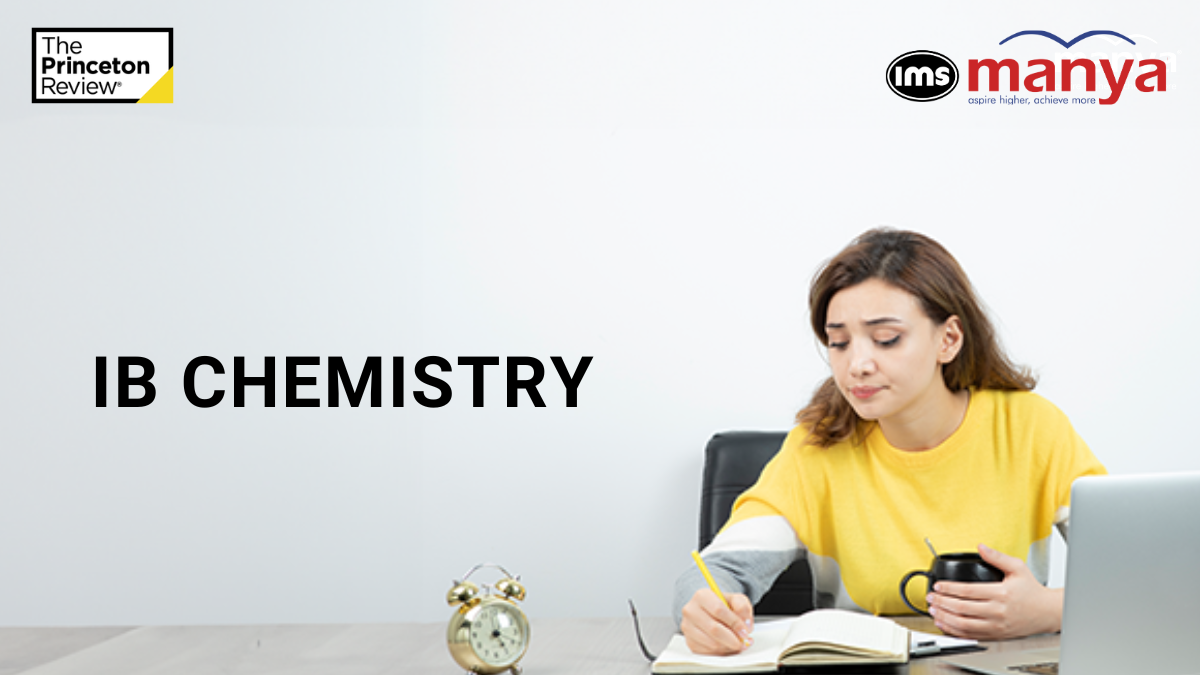IB Chemistry Syllabus & Curriculum Guide | Expert Online Tutoring

IB Chemistry is a core scientific discipline that explains life at the molecular level. The syllabus includes numerous abstract concepts that require consistent time, effort, and dedication from both students and tutors. As a vital branch of experimental science, IB Chemistry focuses on investigating a compound’s structure, composition, molecular arrangements, chemical and physical properties, and its interactions with other elements and compounds.
The IB Chemistry curriculum emphasizes hands-on learning, encouraging students to perform experiments and engage in various practical investigations. It also helps learners develop skills for solving IB Chemistry data-based questions effectively.
IB Chemistry Syllabus
The IB Chemistry syllabus consists of topics divided into 11 sections:
| IB Chemistry Syllabus Topics | Description |
| Stoichiometric Relationships | Covers mole concepts, chemical formulas, and quantitative chemical calculations essential for solving IB Chemistry data based questions. |
| Atomic Structure | Focuses on the structure of atoms, electron configuration, and isotopes within the IB Chemistry curriculum. |
| Periodicity | Explores periodic table trends in atomic radius, ionization energy, and electronegativity. |
| Chemical Bonding and Structure | Studies ionic, covalent, and metallic bonding along with molecular geometry. |
| Energetics / Thermochemistry | Examines energy changes, enthalpy, and thermodynamic principles in chemical reactions. |
| Chemical Kinetics | Analyzes reaction rates, collision theory, and factors affecting reaction speed. |
| Equilibrium | Discusses dynamic equilibrium, Le Chatelier’s Principle, and equilibrium constants. |
| Acids and Bases | Covers pH calculations, acid-base theories, and titration techniques. |
| Redox Processes | Studies oxidation-reduction reactions, electrochemical cells, and redox equations. |
| Organic Chemistry | Investigates carbon compounds, functional groups, and organic reaction mechanisms. |
| Measurement and Data Processing | Focuses on data analysis, error margins, and experimental accuracy in IB Chemistry. |
IMS Manya – The Princeton Review’s IB Chemistry online academic tutoring is designed to showcase the exciting and engaging side of chemistry, sparking students’ curiosity regardless of their future career paths. The program presents chemistry concepts in a dynamic way, helping learners connect complex topics from syllabus with simple, relatable analogies.
Our expert IB tutors try to bridge the gap between chemistry’s scientific depth and its real-world applications. By aligning lessons with the curriculum, we ensure students gain a deeper understanding of theoretical concepts and practical skills. Through targeted practice, including solving data-based questions, students not only master challenging topics but also develop the confidence to excel in exams and beyond.
IB Chemistry Curriculum
The curriculum offers a comprehensive framework covering core concepts, practical investigations, and advanced topics. This enables students to master the syllabus and apply knowledge through real-world experiments and data-based questions.
1: Stoichiometric Relationships (13.5 Hours)
Introduction to the particulate nature of matter and chemical change
- The mole concept
- Reacting masses and volumes
2: Atomic Structure (6 Hours)
- The nuclear atom
- Electron configuration
3: Periodicity (6 Hours)
- Periodic table
- Periodic trends
4: Chemical Bonding and Structure (13.5 Hours)
- Ionic bonding and structure
- Covalent bonding
- Covalent structures
- Intermolecular forces
- Metallic bonding
5: Energetics/Thermochemistry (9 Hours)
- Measuring energy changes
- Hess’s Law
- Bond enthalpies
6: Chemical Kinetics (7 Hours)
- Collision theory and rates of reaction
7: Equilibrium (4.5 Hours)
- Equilibrium
8: Acids and Bases (6.5 Hours)
- Theories of acids and bases
- Properties of acids and bases
- The pH scale
- Strong and weak acids and bases
- Acid deposition
9: Redox Processes (8 Hours)
- Oxidation and reduction
- Electrochemical cells
10: Organic Chemistry (11 Hours)
- Fundamentals of organic chemistry
- Functional group chemistry
11: Measurement and Data Processing (10 Hours)
- Uncertainties and errors in measurement and results
- Graphical techniques
- Spectroscopic identification of organic compounds
Additional Higher Level (AHL) Topics (Variable)
- Advanced atomic theory and quantum models
- Thermodynamics and entropy changes
- Advanced chemistry kinetics
- Further organic chemistry
- Transition metals and coordination chemistry
Practical Work/ Internal Assessment ( 40 hours)
- Hands on laboratory experiments to apply theoretical concepts
- Data-based questions practice
- Designing and conducing an individual investigation
- Data collection, processing and error analysis
- 40 hours dedicated to practical and investigative work
Frequently Asked Questions
What is IB Chemistry?
It is a core subject in the International Baccalaureate (IB) Diploma Programme that explores the structure, composition, and properties of matter. The course combines theoretical concepts with practical laboratory work, enabling students to connect scientific principles with real-world applications.
What does the IB Chemistry syllabus include?
The syllabus covers 11 core topics such as Stoichiometric Relationships, Atomic Structure, Chemical Bonding, Energetics, Kinetics, Equilibrium, Acids and Bases, Redox Processes, Organic Chemistry, and Measurement & Data Processing.
How is the IB Chemistry curriculum structured?
The curriculum is divided into core topics, additional higher-level (AHL) material for HL students, and an internal assessment.
What are IB Chemistry data based questions?
Data based questions are exam-style problems that require students to analyze experimental data, interpret graphs or tables, and apply concepts to solve real-world problems.
How can I prepare effectively for IB Chemistry exams?
To prepare, students should thoroughly understand the syllabus, practice past papers, solve data based questions regularly, and engage in hands-on experiments.





